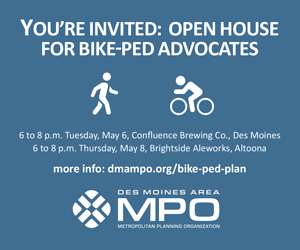GUEST OPINION: What’s luck got to do with it?

I was one of 1,400 people who had the chance to hear Jim Collins’ talk about his book “Great by Choice” at the Iowa Association of Business and Industry’s 2012 conference in June. I was particularly struck by his discussion of luck.
Collins said he wanted to know how to thrive in uncertainty and how to lead in chaos, while dealing with numerous big disruptive forces that we cannot predict or control.
In the process of his work, two questions emerged: “Just what is the role of luck? And how, if at all, should luck factor into developing our strategies for survival and success?”
I have thought about luck – both good and bad – for a long time. How much of what happens to us is the result of what we call “luck”? In order to answer his question, Collins quantified both good and bad luck. He calls it the luck test, and a luck event has three elements:
1. You didn’t cause it.
2. It can have a potentially good or bad consequence.
3. There is an element of surprise or unpredictability.
From his research, Collins concluded that luck does not separate the good from the great. He found that great leaders seem to recognize a luck event. They know it, leverage it and maximize it.
At the presentation, someone asked Collins how to recognize good luck. He said that leaders seem to be able to “zoom in” on the task at hand and “zoom out” to recognize when a luck event has happened. The leaders then are able to consider whether they should let it disrupt their plans. Great people and organizations make more of the luck they get, which Collins calls “Return on Luck” (ROL).
As is his nature, Collins asks questions such as:
• What will you do with the luck that you get?
• What is your ROL?
• What is the best kind of luck?
After years of research, Collins concluded that resilience, not luck, is the signature of greatness. So what is resilience? How can we learn to be resilient? According to Diane Coutu in her Harvard Business Review article “How Resilience Works,” resilient people possess three characteristics that hold true for resilient organizations as well:
1. A staunch acceptance of reality.
2. A deep belief supported by strong values that life is meaningful.
3. An ability to improvise.
I value how Collins continually integrates work with life. Leadership includes how we lead our own lives. Because life is about people and relationships, Collins said that the best kind of luck is “who luck.” Who are the people in your life whom you feel lucky to know? Who luck includes our mentors, partners, friends and others who enrich our lives. Making sure that these people know how fortunate we feel to have them in our lives is critical.
Collins said he believes it is hard to have a great life if you don’t spend time with people you love.
“It is hard to have a great life without meaningful work – work that gives your life intrinsic meaning,” he said. “It is important to know that your short time was well spent and that it mattered.”
And a meaningful life makes us resilient to life’s challenges and uncertainties.
Jann Freed, Ph.D., is a leadership development and change management consultant at The Genysys Group.







